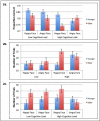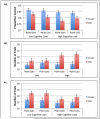Attenuating age-related learning deficits: emotional valenced feedback interacts with task complexity
- PMID: 23163707
- PMCID: PMC3584197
- DOI: 10.1037/a0030071
Attenuating age-related learning deficits: emotional valenced feedback interacts with task complexity
Abstract
Previous research reveals that older adults sometimes show enhanced processing of emotionally positive stimuli relative to negative stimuli, but that this positivity bias reverses to become a negativity bias when cognitive control resources are less available. In this study, we test the hypothesis that emotionally positive feedback will attenuate well-established age-related deficits in rule learning whereas emotionally negative feedback will amplify age deficits-but that this pattern will reverse when the task involves a high cognitive load. Experiment 1 used emotional face feedback and revealed an interaction among age, valence of the feedback, and task load. When the task placed minimal load on cognitive control resources, happy-face feedback attenuated age-related deficits in initial rule learning and angry-face feedback led to age-related deficits in initial rule learning and set shifting. However, when the task placed a high load on cognitive control resources, we found that angry-face feedback attenuated age-related deficits in initial rule learning and set shifting whereas happy-face feedback led to age-related deficits in initial rule learning and set shifting. Experiment 2 used less emotional point feedback and revealed age-related deficits in initial rule learning and set shifting under low and high cognitive load for point-gain and point-loss conditions. The research presented here demonstrates that emotional feedback can attenuate age-related learning deficits-but only positive feedback for tasks with a low cognitive load and negative feedback for tasks with high cognitive load.
PsycINFO Database Record (c) 2013 APA, all rights reserved.
Figures




Similar articles
-
Age-related emotional bias in processing two emotionally valenced tasks.Psychol Res. 2017 Jan;81(1):289-308. doi: 10.1007/s00426-015-0711-8. Epub 2015 Oct 20. Psychol Res. 2017. PMID: 26486647
-
Social incentives improve deliberative but not procedural learning in older adults.Front Psychol. 2015 Apr 16;6:430. doi: 10.3389/fpsyg.2015.00430. eCollection 2015. Front Psychol. 2015. PMID: 25932016 Free PMC article.
-
The influence of task complexity and information value on feedback processing in younger and older adults: No evidence for a positivity bias during feedback-induced learning in older adults.Brain Res. 2019 Aug 15;1717:74-85. doi: 10.1016/j.brainres.2019.04.011. Epub 2019 Apr 13. Brain Res. 2019. PMID: 30991040
-
Binocular rivalry: a window into emotional processing in aging.Psychol Aging. 2011 Jun;26(2):372-80. doi: 10.1037/a0022029. Psychol Aging. 2011. PMID: 21443353
-
The developmental cognitive mechanism of learning algebraic rules from the dual-process theory perspective.Psych J. 2024 Aug;13(4):517-526. doi: 10.1002/pchj.749. Epub 2024 Apr 15. Psych J. 2024. PMID: 38618751 Free PMC article. Review.
Cited by
-
Social feedback enhances learning in Williams syndrome.Sci Rep. 2023 Jan 4;13(1):164. doi: 10.1038/s41598-022-26055-8. Sci Rep. 2023. PMID: 36599864 Free PMC article.
-
Emotional feedback ameliorates older adults' feedback-induced learning.PLoS One. 2020 Apr 30;15(4):e0231964. doi: 10.1371/journal.pone.0231964. eCollection 2020. PLoS One. 2020. PMID: 32352992 Free PMC article.
-
Motivational Influences on Performance Monitoring and Cognitive Control Across the Adult Lifespan.Front Psychol. 2018 Jun 26;9:1018. doi: 10.3389/fpsyg.2018.01018. eCollection 2018. Front Psychol. 2018. PMID: 29997541 Free PMC article.
-
Age-related variability in decision-making: Insights from neurochemistry.Cogn Affect Behav Neurosci. 2019 Jun;19(3):415-434. doi: 10.3758/s13415-018-00678-9. Cogn Affect Behav Neurosci. 2019. PMID: 30536205 Free PMC article. Review.
-
Does the Effort of Processing Potential Incentives Influence the Adaption of Context Updating in Older Adults?Front Psychol. 2017 Nov 9;8:1969. doi: 10.3389/fpsyg.2017.01969. eCollection 2017. Front Psychol. 2017. PMID: 29170649 Free PMC article.
References
-
- Ashby FG, Alfonso-Reese LA, Turken U, Waldron EM. A neuropsychological theory of multiple systems in category learning. Psychological Review. 1998;105:442–481. - PubMed
-
- Ashby FG, Maddox WT. Human category learning. Annual Review of Psychology. 2005;56(1):149–178. - PubMed
-
- Braver TS, Barch DM. A theory of cognitive control, aging cognition, and neuromodulation. Neuroscience & Biobehavioral Reviews. 2002;26(7):809–817. - PubMed
-
- Carstensen LL, Pasupathi M, Mayr U, Nesselroade JR. Emotional experience in everyday life across the adult life span. Journal of Personality and Social Psychology. 2000;79(4):644–645. - PubMed
Publication types
MeSH terms
Grants and funding
LinkOut - more resources
Full Text Sources
Other Literature Sources
Medical

